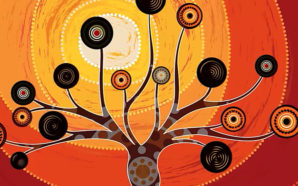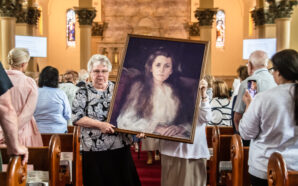Homily for the 15th Sunday in Ordinary Time
Readings: Amos 7:12-15; Ephesians 1:3-14; Mark 6:7-13
11 July 2021
How good it has been to round out NAIDOC Week with Ash Barty on centre court at Wimbledon 50 years after Evonne Goolagong first won the tournament there in 1971. After her semi-final win against Angelique Kerber, Ash said, “This is incredible. This is close to as good a tennis match as I’ll ever play. Angie really brought the best out of me today. I’m incredibly proud of myself and my team and now I get the chance on Saturday to live out a total dream.”
LISTEN: https://soundcloud.com/frank-brennan-6/homily-11721
Next morning she said, “Wimbledon for me has been an amazing place of learning.” She looked back on previous losses there, saying, “A lot of the time, your greatest growth comes from your darkest times. That’s why this tournament has been so important to me. I’ve learned so much with all my experiences – the good, bad, everything in between I’ve been able to learn from. Just to be able to keep chipping away, keep putting yourself out there, let yourself be vulnerable, just be yourself, knowing that everything that comes with that is an opportunity to learn.”
Barty is just so down to earth, so grounded – that’s one thing we all like about her. She has reached the pinnacle of her sport without losing touch with where she comes from, with who she is. She gives us a clue about the prophet Amos in today’s first reading.
Amos is a prophet from the southern kingdom who has turned up in the northern kingdom at Bethel, the royal sanctuary, the national temple. Amos does not belong there. Amaziah, the priest of Bethel, makes this very clear to Amos. Amos was not seeking to be there. He was not putting himself forward. There he is in the north, having come from the south, predicting the destruction which is to come. Forty years later the northern kingdom will be overrun by the Assyrians and destroyed. Amos had been a shepherd, a farmer, just minding his own business down in the south, minding sheep and tending to sycamore trees. He was commissioned by Yahweh to go north and prophesy to the people there. And what a prophecy it was. When Amaziah gets all high and mighty (as some religious authorities are wont to do, particularly when they are on their home turf, and when they are confronting the outsider), Amos, the one without the flash qualifications, the one without the official position, responds with the completely unvarnished prophecy:
Very well, this is what Yahweh says,
“Your wife will be forced to go on the streets,
your sons and daughters will fall by the sword,
your land be parcelled out by measuring line,
and you yourself die on unclean soil
and Israel will go into exile far distant from its own land.”[1]
Take that, ye of the priestly caste. Your wife will be forced into prostitution. Your kids will be killed. You’ll lose all your land. You will die a foreigner in exile.
Bishop Vincent Long fled his homeland on a fishing boat after the Vietnam War. He ended up settling in Australia as a refugee. He’s been copping quite a deal of flak lately – the sort of flak reserved for outsiders who don’t quite belong in the royal sanctuary, the national temple. Recently he delivered the Helder Camara Lecture at Newman College. While others who lead our Church are urging that there is little need for change, and that in fact, change is antipathetic to the Roman tradition, Long declared:
”Unless we genuinely repent of institutional failures and unless we convert to the radical vision of Christ and let it imbue our attitudes, actions and pastoral practices, we will not be able to restore confidence and trust in the Church.”
“Until we have the courage to admit the old ways of being Church, which is steeped in a culture of clerical power, dominance and privilege, we cannot rise to a Christ-like way of humility, inclusivity, compassion and powerlessness.”[2]
Looking ahead to our forthcoming Plenary Council, we have to ask where are those like Amos coming up from the south, coming in from the fields, and able to deliver a blunt message to those used to inhabiting the royal sanctuary, the national temple.
In today’s gospel, Jesus sends out the Twelve instructing them “to take nothing for the journey except a staff – no bread, no haversack, no coppers for their purses”. Sandals, yes. But no spare tunic. You get the picture. Travel light. Trust in others. Trust in the message you carry. If people won’t listen, if they don’t welcome you, don’t despair: “as you walk away shake off the dust from under your feet”. Like the Twelve, we’re given the same instruction today: travel light; have trust; and have no hesitation wiping the dust from your feet.
When we are welcomed, we are able then to remove our sandals. Pope Francis in his 2013 Apostolic Exhortation Evangelii Gaudium puts it this way:[3]
In a culture paradoxically suffering from anonymity and at the same time obsessed with the details of other people’s lives, shamelessly given over to morbid curiosity, the Church must look more closely and sympathetically at others whenever necessary. In our world, ordained ministers and other pastoral workers can make present the fragrance of Christ’s closeness and his personal gaze. The Church will have to initiate everyone – priests, religious and laity – into this “art of accompaniment” which teaches us to remove our sandals before the sacred ground of the other (cf. Ex 3:5). The pace of this accompaniment must be steady and reassuring, reflecting our closeness and our compassionate gaze which also heals, liberates and encourages growth in the Christian life.
As we prepare for the Plenary Council, let’s be attentive to those who have walked away shaking the dust from their feet believing that we have refused to listen to them. They may be responding to the gospel imperative shaking the dust from their feet. But what is the gospel imperative to us who have not heard their cries, their pleas or their insights? They may have something constructive to say to us if we invite them back, something to contribute to our predicament as Church.
Let’s remove our sandals marking out a sacred space of encounter where Amos can be heard and where Amaziah can get down off his high horse. And despite all the unfinished business as we conclude NAIDOC Week with the theme Heal Country, let’s thank God for a champion model like Ash Barty who hasn’t let it go to her head, who has learnt from the good, the bad, and everything in between, letting herself be vulnerable, being her best and true self – and evoking that from us too.
[1] Amos 7:16-17
[2] Bishop Vincent Long, “My hope for the Plenary Council”, Dom Helder Camara Lecture, Newman College, 30 June 202, available at https://catholicoutlook.org/bishop-vincent-my-hope-for-the-plenary-council/
[3] Pope Francis, Evangelii Gaudium #169
Fr Frank Brennan is a member of the Commonwealth Government’s 19-member Senior Advisory Group overseeing the Co-Design process for the Indigenous Voice. The Group is chaired by Aboriginal leaders Marcia Langton and Tom Calma.
Fr Frank Brennan SJ is the Rector of Newman College, Melbourne and the former CEO of Catholic Social Services Australia (CSSA).








